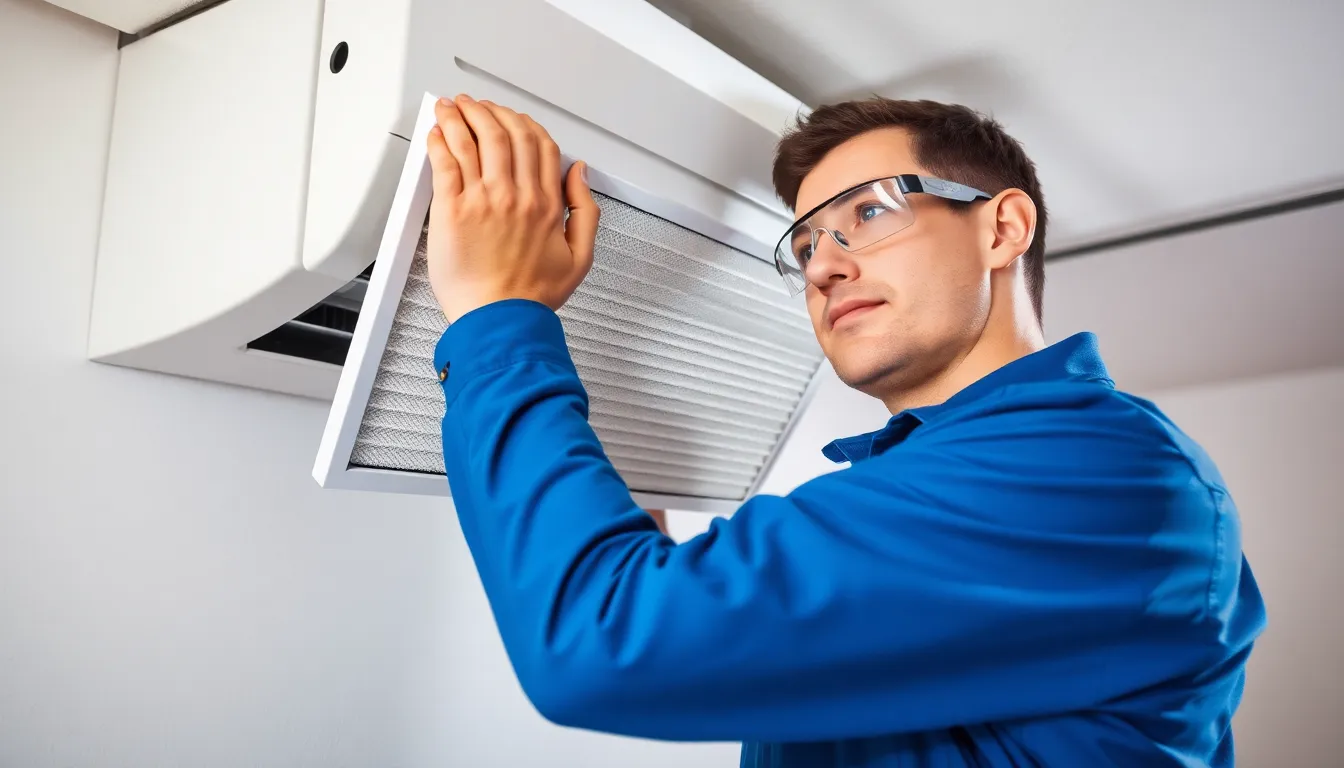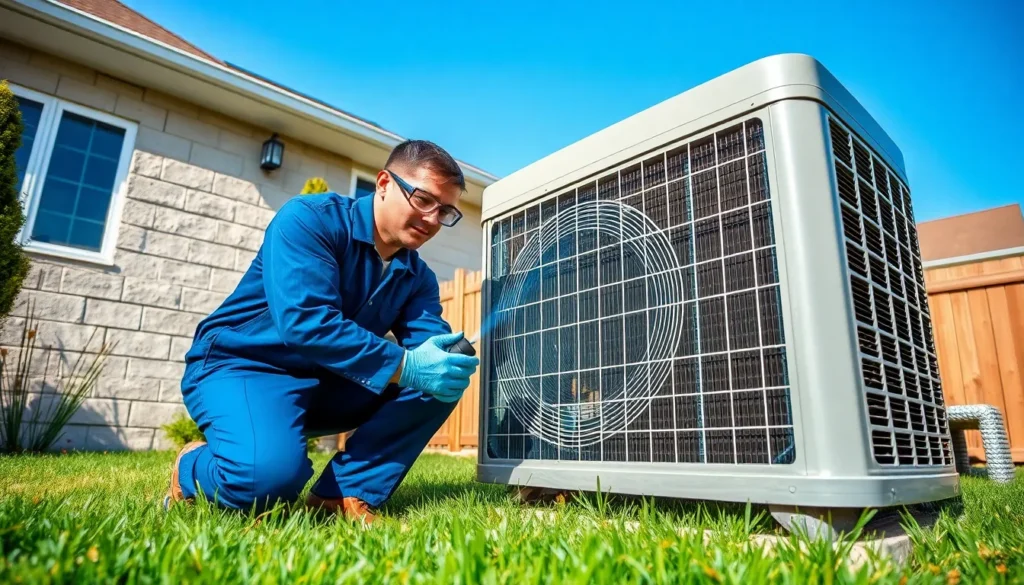Table of Contents
ToggleMaintaining an efficient HVAC system is crucial for comfort and energy savings in any home or business. Regular HVAC maintenance not only extends the lifespan of the equipment but also ensures it operates at peak performance. Neglecting these essential tasks can lead to costly repairs and increased energy bills, leaving many to wonder how to keep their systems running smoothly.
From changing air filters to scheduling professional inspections, understanding the key components of HVAC maintenance can save time and money in the long run. As seasons change, so do the demands on heating and cooling systems, making proactive care more important than ever. By prioritizing HVAC maintenance, property owners can enjoy a comfortable environment while maximizing energy efficiency.
Importance of HVAC Maintenance
Regular HVAC maintenance offers significant advantages for comfort and system longevity. Prioritizing upkeep ensures optimal performance and efficiency throughout the year.
Benefits for Homeowners
- Increased Lifespan: Routine maintenance extends the life of HVAC systems by addressing issues before they escalate. Systems that receive regular care often last 15 to 20 years, compared to 10 to 15 years without proper upkeep.
- Improved Comfort: Regular check-ups maintain consistent temperatures and humidity levels, enhancing indoor comfort. Properly maintained systems eliminate hot or cold spots in a property.
- Cost Savings: Routine maintenance reduces the likelihood of unexpected repair costs. Homeowners save an average of 30% on utility bills by improving system efficiency through maintenance.
Impact on Energy Efficiency
- Lower Energy Consumption: Well-maintained HVAC systems operate more efficiently, leading to reduced energy consumption. Clean filters and coils support optimal air flow, requiring less energy to cool or heat a space.
- Decreased Carbon Footprint: Improved system efficiency contributes to a lower carbon footprint. Energy-efficient HVAC systems emit fewer greenhouse gases, promoting environmental sustainability.
- Enhanced System Performance: Regular inspections identify and correct issues, ensuring systems operate at peak performance. Peak performance correlates directly with lower energy bills and fewer service interruptions.
Common HVAC Maintenance Tasks

Regular maintenance tasks enhance HVAC system performance and longevity. Performing these tasks helps ensure optimal functionality and energy efficiency.
Regular Filter Replacement
Replacing air filters every 1-3 months significantly improves indoor air quality and system efficiency. Clogged filters restrict airflow, causing systems to work harder, leading to higher energy costs. It’s essential to check filters monthly, especially during peak usage seasons, and replace them as needed.
Cleaning Coils and Fins
Cleaning evaporator and condenser coils annually boosts heat exchange efficiency. Dirt accumulation on coils decreases their ability to transfer heat, increasing energy consumption. Users should ensure that outdoor units are free from debris. Additionally, bending fins back into shape can enhance airflow and efficiency.
Checking Refrigerant Levels
Checking refrigerant levels annually prevents issues such as decreased cooling performance and increased energy bills. Low refrigerant may indicate leaks, compromising system efficiency. Qualified technicians should conduct refrigerant checks and ensure levels align with manufacturer specifications. Regular monitoring helps maintain optimal performance and prevents major repairs.
Seasonal HVAC Maintenance Checklist
Routine HVAC maintenance adjusts to seasonal changes, ensuring systems perform efficiently throughout the year. The following tips outline essential tasks for both spring and fall.
Spring Maintenance Tips
- Replace air filters every 1-3 months to enhance airflow and indoor air quality.
- Inspect and clean ducts to remove dust and debris, which can hinder efficiency.
- Check coolant levels to maintain optimal cooling performance and prevent system strain.
- Clean outdoor units and remove any obstructions like leaves or debris to promote airflow.
- Test the thermostat for accuracy, ensuring it operates correctly before the heat demand increases.
- Schedule a professional inspection to identify potential issues before peak cooling season.
Fall Maintenance Tips
- Replace air filters again to ensure efficiency as heating demands increase.
- Examine furnace components for wear and tear, ensuring all parts function correctly.
- Check and clean flue and vents to facilitate proper airflow and prevent dangerous fumes from accumulating.
- Inspect and seal ductwork to prevent energy loss, ensuring a more efficient heating system.
- Verify the efficiency of heating elements and the heat exchanger to ensure safe and effective heating.
- Schedule a professional servicing to get the system ready for colder temperatures and identify any areas for improvement.
Professional HVAC Maintenance Services
Professional HVAC maintenance services play a vital role in ensuring systems operate efficiently. Engaging qualified technicians enhances system performance and prolongs equipment lifespan while minimizing unexpected repair costs.
Choosing the Right Contractor
Choosing a reputable contractor requires careful consideration. Seek technicians with valid licenses and certifications to ensure compliance with local codes. Verify customer reviews and ratings to gauge service quality. Confirm that the contractor possesses experience with specific HVAC systems for tailored solutions. Compare quotes from several contractors to assess competitive pricing without compromising on quality. Ensuring the contractor provides clear terms and a detailed service outline prevents misunderstandings and sets clear expectations.
Understanding Service Contracts
Understanding service contracts is crucial for effective maintenance planning. Review contract details to identify covered services, which may include regular inspections, filter changes, and emergency repairs. Assess the contract duration, cancellation policy, and any associated fees to avoid surprises. Some contracts offer priority service during peak seasons, improving response times for urgent issues. Ensure the contract aligns with specific HVAC needs and seasonal demands, providing peace of mind and consistent performance for the entire year.
Regular HVAC maintenance is essential for ensuring optimal performance and comfort in any space. By committing to routine upkeep property owners can enjoy longer system lifespans and reduced energy costs. Seasonal checklists and proactive inspections play a crucial role in maintaining efficiency and preventing costly repairs.
Engaging professional services enhances performance and provides peace of mind. Choosing a reputable contractor ensures that systems receive the care they need to function effectively. Prioritizing HVAC maintenance not only leads to immediate benefits but also contributes to a sustainable and comfortable environment for years to come.





